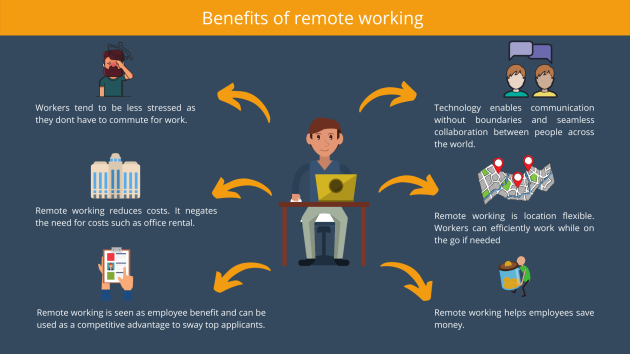The workplace landscape has undergone a transformative shift in recent years, with remote work emerging as a powerful and adaptable model. As technology continues to advance, the advantages of remote work have become increasingly evident, reshaping the way individuals and organizations approach professional life. In this article, we will explore the myriad benefits that remote work brings to both employees and employers.

Flexibility and Work-Life Balance:
- One of the primary advantages of remote work is the flexibility it offers. Employees can structure their work hours to align with their peak productivity, allowing for better work-life balance.
- Flexibility is especially beneficial for individuals with personal commitments, as they can better manage family responsibilities, personal interests, and other non-work obligations.
- Increased Productivity:
- Contrary to common concerns, many remote workers report increased productivity. The absence of daily commutes, office distractions, and the ability to create a personalized work environment contribute to heightened focus and efficiency.
- Remote workers often have the autonomy to choose optimal working conditions, leading to improved concentration and output.
- Cost Savings for Both Employees and Employers:
- Remote work eliminates the need for daily commutes, resulting in significant cost savings for employees in terms of transportation, fuel, and work attire.
- Employers benefit from reduced overhead costs associated with maintaining physical office spaces, such as rent, utilities, and office supplies.
- Access to a Global Talent Pool:
- Remote work transcends geographical boundaries, allowing organizations to tap into a diverse and global talent pool.
- Companies can attract skilled professionals regardless of their location, fostering diversity and bringing a variety of perspectives to the workforce.
- Reduced Commuting Stress and Environmental Impact:
- Remote work contributes to a reduction in traffic congestion and environmental pollution by minimizing the need for daily commuting.
- Employees experience less stress associated with commuting, leading to improved mental well-being and overall job satisfaction.
- Enhanced Employee Retention and Recruitment:
- Offering remote work options enhances an organization’s appeal to potential employees. It can be a decisive factor for job seekers, contributing to improved recruitment outcomes.
- Remote work is also associated with higher employee satisfaction, reducing turnover rates and fostering long-term organizational loyalty.
- Better Workforce Diversity and Inclusion:
- Remote work enables companies to build diverse and inclusive teams by focusing on skills and talent rather than geographic proximity.
- Individuals with disabilities or those facing geographical constraints can participate in the workforce more readily, promoting a culture of inclusivity.
- Adaptability in Unforeseen Circumstances:
- The COVID-19 pandemic highlighted the importance of remote work in ensuring business continuity during unforeseen circumstances.
- Remote work provides a flexible framework that allows organizations to adapt quickly to unexpected events, such as natural disasters, health crises, or other disruptions.
- Improved Work Satisfaction and Morale:
- Remote work is often associated with increased job satisfaction and morale, as employees appreciate the trust and autonomy bestowed upon them.
- Remote workers often feel more empowered, leading to a positive impact on their overall well-being and job engagement.
- Technological Advancements and Connectivity:
- Advances in technology, including high-speed internet, video conferencing, and collaboration tools, facilitate seamless communication and collaboration among remote teams.
- The evolving digital landscape ensures that remote work is not just feasible but increasingly efficient and connected.
Conclusion:
The advantages of remote work extend far beyond the convenience of working from home. By embracing this flexible model, organizations and employees can unlock a wealth of benefits, from improved work-life balance to enhanced productivity and a more diverse, inclusive, and satisfied workforce. As remote work continues to evolve, it is poised to play a pivotal role in shaping the future of work.